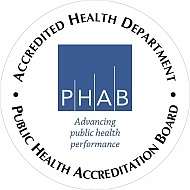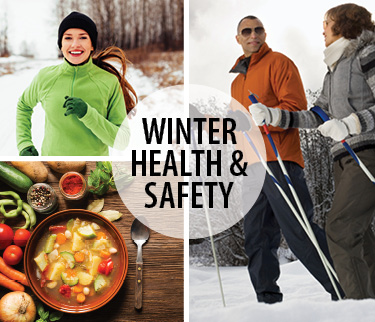Many of us ring in the New Year with resolutions to lose weight. Unfortunately, these good intentions may cause many of us to crash diet or try the latest fad diets that promise quick weight loss. These approaches may do more harm than good to your health and emotional well-being. A better goal for 2019 is to change your lifestyle by adding healthy habits that will improve your overall health: being active, eating healthy, staying safe, managing stress, and getting regular check-ups. Work on adding one habit at a time, such as eating more fruits and vegetables, and enjoy the benefits of making the shift to a healthier life!
Getting a flu vaccine is the best way to protect yourself against the flu. Flu vaccines are recommended for all people age 6 months and older. The best time to get a flu vaccine is October or November, but getting the vaccine later than that still offers protection because flu season usually lasts into spring. If you have not received your flu vaccine, call your doctor today to make an appointment, or check the Flu Vaccine Finder to find a retail location near you. You may also attend the Health Department Immunization Clinic which is held each Wednesday from 9:00am - 12:00 noon in room 30 (basement level) of the Civic Center. Call 315-435-2000 for availability.
In addition to getting a flu vaccine, take extra hygiene precautions to protect yourself and others from the flu. Wash your hands often with warm water and soap, cover your nose and mouth with a tissue or your arm when you sneeze or cough. If you get sick with the flu, stay home until 24 hours after the fever is gone.
Thinking of quitting smoking this year? Don't do it alone! Talk to your health care provider to find the best treatment for your addiction. When you work with your health care provider on a plan to be smoke-free, you double your chance of being successful. Most health insurances, including Medicaid, cover both medication and visits with your provider to help you stop smoking. For additional free and confidential help, you can call the New York State Smokers' Quitline at 1-866-NY-QUITS (1-866-697-8487).
Stay safe this winter while driving! Remember these tips:
- Make sure your tires are in good condition and properly inflated. Snow tires are best.
- Prepare and carry a winter kit including a snowbrush, small shovel, sand or kitty litter, blanket, energy bars, candles/matches in a watertight container, potable water, and a flashlight with extra batteries.
- Keep your gas tank at least half full to avoid gas line freeze up.
- If you start to skid, look and steer where you want to go.
- Do NOT use cruise control when driving on slippery surfaces.
- Keep your car clear of snow. Leaving a trail of snow behind your car creates a ‘white-out’ condition for those behind you, and you may be ticketed.
- Buckle up and don’t drink and drive.
- Above all, SLOW DOWN and give yourself plenty of following distance. The key to safe driving is adapting to the conditions.
Before you travel, tell someone where you are going, the route you are taking, and your expected time of arrival. Keep your cell phone fully charged. For road conditions, call the New York State Thruway at 1-800-847-8929 or visit www.thruway.state.ny.gov.
^Back to top
The use of fuel burning heaters, generators, or charcoal grills in poorly ventilated living areas can lead to carbon monoxide poisoning. Carbon monoxide is an odorless gas that when breathed in can cause shortness of breath, dizziness, weakness, nausea, confusion, and headache in mild cases, to coma and death in severe cases. Prevent carbon monoxide poisoning with the following tips:
- Make sure that your living area has a carbon monoxide detector and you know how to use it. Amanda’s Law went into effect on February 22, 2010, which requires that all homes in New York State have carbon monoxide detector installed in the home.
- Do not use grills or generators indoors or in poorly ventilated areas like a garage or shed.
- Make sure your furnace is serviced once a year.
For further information, please visit www.cdc.gov/co/faqs.htm
Severe winter weather sometimes leaves us without power. If the power is out for less than 2 hours, then the food in your refrigerator and freezer will be safe to consume. Keep the refrigerator and freezer doors closed to keep food cold for longer. If the power is out for longer than 2 hours, follow the guidelines below:
- For the freezer section: A freezer that is half full will hold food safely for up to 24 hours. A full freezer will hold food safely for 48 hours. Do not open the freezer door if you can avoid it.
- For the refrigerated section: Pack milk, other dairy products, meat, fish, eggs, gravy, and spoilable leftovers into a cooler surrounded by ice.
- Use a digital quick-response thermometer to check the temperature of your food right before you eat it or cook with it. Throw away any food that has a temperature of more than 40 degrees Fahrenheit.
- Before refreezing food when the power comes back on, see the Food Safety and Inspection Service’s guidelines on Food Safety in an Emergency.
For more information about food safety, call the Onondaga County Health Department’s Food Protection Section at 315-435-6607.
Don't let the winter weather put a chill on your physical activities. The national guidelines for physical activity are 150 minutes per week for adults and 60 minutes on most days for children. Take advantage of the snowy season—make a snowman, snow fort, or snow angels with your children. Try out a new winter sport like snowshoeing, ice skating, and downhill or cross country skiing. Whatever activity you choose, remember to dress warmly!
If you have heart disease or high blood pressure, keep in mind that doing strenuous activities in the cold weather can put an extra strain on your heart. Always check with your doctor about whether you should be shoveling snow or doing other physical work in the cold.
If you love to snowmobile or are new to the sport, be sure to learn how to ride safely.
- All youth should take the New York State certification course and get adult supervision.
- Learn the snowmobile traffic safety laws and regulations in your area.
- Wear appropriate gear and clothing, including helmet with face cover, gloves and boots.
- Follow trail markers and signs, and use safe speeds.
- Cross roads safely and always at a right angle to traffic.
- Ride with a friend, never alone; let family or friends know planned routes and arrival times.
- Never ride on bodies of water.
- At nighttime, use slower speed and never ride in unfamiliar areas.
- Do not ride under the influence of drugs or alcohol.
Click here to visit the New York State Snowmobiling Association for more safe riding tips and information about certification courses.
Severe winter weather—snow and ice storms, frigid temperatures—happens in CNY. Loss of electricity on top of that leads to concerns on how to take care of ourselves. Having a plan and gathering the supplies you need in advance can help you get through winter a little easier:
- Gather the supplies you need as soon as you know there may be a severe storm. Have everything you would need for a winter power outage—flashlights and batteries, candles, blankets, warm clothes, snacks, and water—in one place so you don’t have to search once the power goes out. If you have a generator, be sure you know how to operate it safely to avoid burns, electric shock, and carbon monoxide poisoning.
- Plan for another place to stay if the power will be out for more than a couple hours. Talk with family and friends that live outside your neighborhood about the possibility of staying with them or know the hotels you are comfortable with. Keep in mind your pets when looking for alternative places to stay.
- Plan for where your child should go if school or daycare is cancelled or closes early. If your child is supposed to go somewhere besides home when school closes early, make sure the school knows. If your child’s school or daycare doesn’t have a notification system, sign up for school closure and cancellation alerts from local media.
- Know where to get information before, during, and after a storm. Visit the National Weather Service and the
National Grid Outage Map.
^Back to top
|



